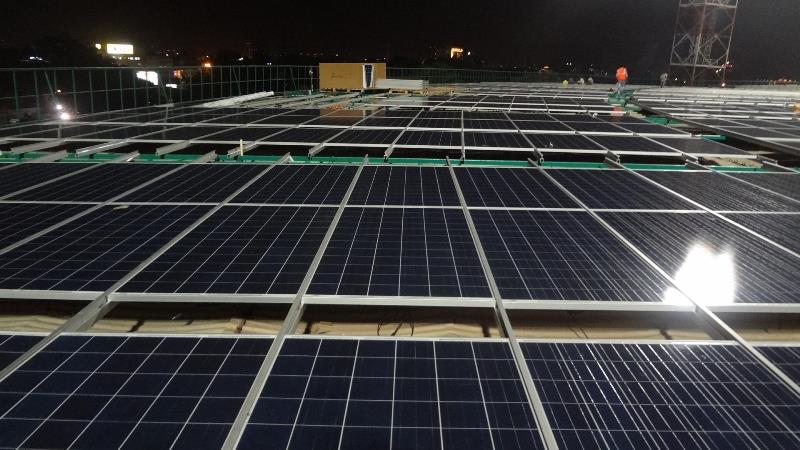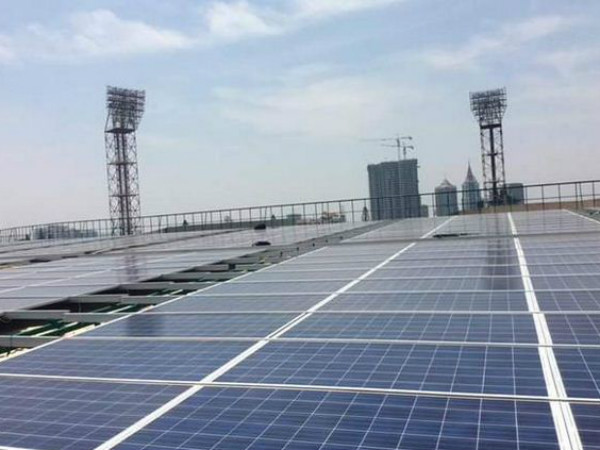Bengaluru’s Chinnaswamy Stadium Becomes The World’s First Solar-Powered Cricket Venue
The newly installed 400kW capacity solar panels will not only bring the down the stadium's power bills but will also generate revenue for KSCA. Know more about the interesting project that makes Chinnaswamy stadium the world's first cricket ground to be solar powered.

The newly installed 400kW capacity solar panels will not only bring the down the stadium’s power bills but will also generate revenue for KSCA. Know more about the interesting project that makes Chinnaswamy stadium the world’s first cricket ground to be solar powered.
IPL is not the only thing that Chinnaswamy Stadium in Bengaluru is making news for. Now, the next time you are stepping into the stadium, be proud as you will be watching the game in what the state cricket association claims to be the world’s only solar-powered cricket ground.
A 400kW Grid Interactive Solar Power Plant has been installed on the roof of the stadium. As per the design, this grid can easily power the entire stadium lighting except the huge high-intensity floodlights.

Photo: Linkedin
Planned by RenXSol Ecotech Pvt. Ltd., a Bengaluru-based solar solutions enterprise, and executed by MRO-TEK, this project will make sure that you are reducing your carbon footprint while enjoying the thrilling matches at the stadium.
“Installing solar panels for power generation is not difficult. Panels are available and can be easily installed. The main part is the design of the building and identifying the right placement of the panels. Once this is sorted, any building can easily be solar powered,” said Srinivas Kumar from RenxSol. He added that the life span of these panels is 25 years and not much maintenance is required.
Inaugurated by Energy Minister DK Shivakumar on Wednesday, the panels are installed on the eastern stands and are estimated to generate 1,700 units of power every day.
As per KSCA Secretary Brijesh Patel, the stadium spends around Rs 1 to Rs. 1.2 crores on electricity bills for using about 18 lakh units of power annually. The new initiative will bring down this cost significantly and is expected to generate 6 lakh units of solar power annually, utilizing a portion of it and selling the surplus to BESCOM.

Photo: www.thisweekbangalore.com
The project was completed in just 50 days. In the second phase, another 850 kV solar photo-voltaic panels will be installed on the western stands. Once finished, the entire project is expected to reduce 600 tonnes of carbon emission annually.
The solar project has 300Wp, 72 cells, multi-crystalline solar panels, with 20 kW Grid Tie type String Inverters, evacuated with bi-directional metering to BESCOM at HT level of 11 KV substation, under the new BESCOM Net Metering Solar Policy. The excess power will be sent to the BESCOM and Karnataka State Cricket Association (KSCA) will be paid Rs. 9.56 per unit, thus generating additional income for the cricket body.
The project, costing Rs. 4.5 crore, was commissioned in February this year and KSCA is expected to break even in just four years. Not only this, it will also be able to generate revenues of Rs. 70-80 lakhs every year with the power it generates.

Photo: Twitter
The solar power project, which is expected to reduce KSCA’s power consumption by a great extent, is inspired by Germany’s fully solar-powered Freiburg football stadium.
Patel has also requested BWSSB to supply sewage water from the neighbouring areas to the stadium, which can then be treated and used for watering its lawns.
As Chinnaswamy stadium becomes the country’s first sports complex to take this sunny step, we hope to see many more sporting facilities taking up similar initiatives to reduce their carbon footprint.
Like this story? Or have something to share? Write to us: [email protected], or connect with us on Facebook and Twitter (@thebetterindia).
If you found our stories insightful, informative, or even just enjoyable, we invite you to consider making a voluntary payment to support the work we do at The Better India. Your contribution helps us continue producing quality content that educates, inspires, and drives positive change.
Choose one of the payment options below for your contribution-
By paying for the stories you value, you directly contribute to sustaining our efforts focused on making a difference in the world. Together, let's ensure that impactful stories continue to be told and shared, enriching lives and communities alike.
Thank you for your support. Here are some frequently asked questions you might find helpful to know why you are contributing?


This story made me
-
97
-
121
-
89
-
167














